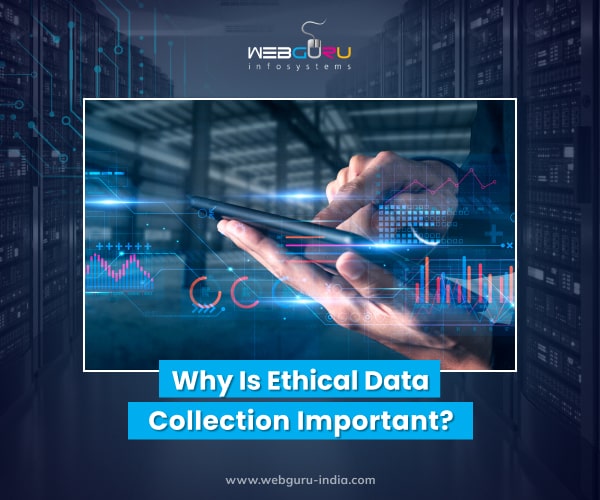Home Blog Digital Marketing Services Why Does Ethics Matter in Data Collection?
Why Does Ethics Matter in Data Collection?
- 03 Oct / 2023
- 2,710 views
- 7 Min Read

With digital devices, online services, and other sources generating a vast quantum of data across omnichannel environments, its sourcing, storage, processing, and analysis have become important. To put things into perspective, about 2.5 quintillion bytes of data are generated every day. In fact, data has become the lifeblood of modern society. Being incredibly powerful, data is harnessed by everyone to act as a currency in the digital age. Be it digital marketing services, eCommerce players, or other industries, data-based analysis has become the norm to compete and excel.
It fuels technological advancements, drives business decisions, and shapes public policy. Data can be leveraged to make and impact decisions at scale and drive them. Yet data comes with its own set of challenges. Its procurement, storage, and use raise ethical questions that demand careful consideration. This issue has arisen due to many unscrupulous practices being followed, including the infamous scandal at Cambridge Analytica. Besides, big tech companies are accused of being complicit in unethical data sourcing practices.
The blog explores the complex landscape of data collection ethics, focusing on the delicate balance between keeping with progress and maintaining privacy.
The Value of Data
Data is invaluable and does many things. It enables scientific research, informs healthcare decisions, optimises resource allocation, and powers the algorithms behind our favourite social media platforms and online services. Data-driven insights have the potential to enhance the quality of our lives in countless ways. These include predicting disease outbreaks and personalising online experiences, among others. Yet, the immense power of data also brings significant responsibility.
Ethical Data Collection Is Not a Choice Anymore
Data is the new oil, so goes the saying. Henceforth, countries that have learnt the art of sourcing, storing, processing, and analysing data will call the shots in geopolitics. It is widely accepted that ethical data collection is the need of the hour. Organisations and governments cannot hide behind the veneer of expediency to let go of ethics in data collection. Blocs such as the European Union and its regulatory laws like GDPR have been given teeth to enforce ethical data collection. Understanding and complying with such regulations have become crucial to avoiding sanctions.
Ethical Dilemmas in Data Collection
The dilemmas businesses face when tasked with collecting data are as follows:
Informed Consent: Getting people’s permission is one of the cornerstones of ethical data collection. People should be properly informed of the type of data being gathered, how it will be used, and given the choice to opt out. True informed permission, however, is sometimes difficult to come by in the age of convoluted terms and conditions and apparently infinite privacy regulations.
Data Privacy: Another tenet of ethical data collection is protecting people’s privacy. It is common knowledge that poor handling of data can lead to severe consequences. These include data breaches, identify theft, and a variety of privacy issues.
Data Accuracy and Bias: The impartiality and veracity of data should be maintained at all costs. Biased or inaccurate data can propagate stereotypes and erode confidence in the data-driven decision-making processes. The issue of bias in data-gathering algorithms is still present.
Data Ownership: The debate rages on whether people should be allowed to have more control over personal data or use it as a shared resource to benefit society. It is always a challenge to find a balance between individual liberty and social good.
Government Surveillance: The surveillance capabilities of governments raise significant ethical questions. Balancing national security interests with individual privacy rights is a constant source of debate, particularly in the age of mass surveillance and digital tracking.
The Ethics of Data Collection in Practice
When it comes to collecting data in practice by companies or even governments, the following areas are mostly involved:
Data in Healthcare: In healthcare, the ethical use of data is critical for patient care and medical research. Striking a balance between sharing data for scientific advancement and safeguarding patient privacy is an ongoing challenge. The recent rise of health tech and wearables also raises questions about who has access to personal health data.
Social media and online services: In order to tailor content and advertisements, social media platforms and internet services acquire enormous volume of personal data. And when data is used to influence user behaviour or when personal information is used for financial gain, the ethics of these practices are called into question. You may also read our blog on the study of eCommerce analytics to comprehend the significance of data.
Data for Social Good: When leveraged to solve urgent societal concerns like poverty, climate change, and public health, data may be a force for good in society. However, it is important to carefully assess the possibility of data exploitation or well-intentioned initiatives that unintentionally affect marginalised people.
Data in Business: Data is a crucial factor in corporate success. Responsible use of consumer data, avoiding monopolistic behaviour, and ensuring that data-driven decision-making benefits organisations and their stakeholders are just a few ethical issues.
How the Ethics of Data Collection Guide IT Services
Let us understand how various IT services fare when it comes to collecting data ethically.
Digital Marketing
Data Collection Ethics: Relevant for digital marketers who need to ensure that the data they collect for targeting and analytics is obtained ethically and in compliance with regulations.
Privacy and Data Collection: It is important for digital marketing services to respect user privacy while collecting data for advertising and marketing purposes.
Informed Consent in Data Collection: Pertinent when digital marketers gather user data, especially when dealing with email lists or user profiles.
Web Development
Data Collection Ethics: Relevant when web developers work on websites that involve data collection, such as e-commerce sites or those with user accounts.
Transparency in Data Collection: It is crucial for web developers to ensure that websites are transparent about data collection practices through privacy policies and disclosures.
Data Collection and Legal Regulations: Crucial for web developers to be aware of and adhere to legal requirements related to data collection on the websites they build. Read our blog on Web 3.0 to understand the role data privacy will play in the next iteration of the World Wide Web.
Mobile App Development
Data Collection Ethics: Relevant when developing mobile apps that collect user data, particularly for apps with features like user accounts or location-based services.
Privacy and Data Collection: It is the need of the hour for mobile app development services to prioritise user privacy and protect user data from misuse.
Informed Consent in Data Collection: Pertinent when mobile apps request permissions or access to user data, ensuring users are well-informed about the purpose of data collection. Additionally, you may read our blog on how big data can influence mobile app development.
In all these contexts, understanding and following data collection ethics is essential to building trust with users, staying compliant with regulations, and maintaining a positive reputation.
Ethical Frameworks for Data Collection
To navigate the complex ethical terrain of data collection, several frameworks and principles have emerged:
Privacy by Design: This concept advocates for privacy considerations to be integrated into the design of systems and technologies at the outset. It emphasises proactive measures to protect data privacy.
Data Minimization: Collect only the data that is necessary for a specific purpose, thereby reducing the risk of misuse and potential privacy violations.
Transparency: Be transparent about data collection and usage practices. Ensure individuals have access to information about what data is being collected and how it will be used.
Anonymization and De-Identification: Remove or encrypt personally identifiable information to protect individual privacy while allowing the same for data analysis.
Algorithmic Fairness: Regularly audit and assess algorithms for bias and take corrective measures to ensure fairness in data-driven decision-making.
Ethical Review Boards: In research and academia, ethical review boards evaluate the ethical implications of data collection and research studies involving human subjects.
Conclusion
Data collection ethics is a complex and developing area of study. We must be steadfast in safeguarding the values of privacy, justice, and accountability, even as we continue to benefit from data-driven decision making. Governments, corporations, researchers, and individuals must work together to strike a balance between driving development and maintaining privacy.
3 comments
Leave a Reply

-
1000+
Happy
Clients -
25+
Countries
Served -
19+
Years of
Trust









Thanks for sharing your thoughts about digital marketing services.
Excellent post.
Great blog post.Much thanks again. Fantastic.